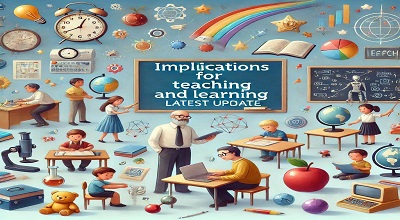Implications for Teaching and Learning
The implications for teaching and learning have evolved significantly in recent years, influenced by technological advancements, changes in societal needs, and a deeper understanding of cognitive processes. Here are some key implications:
Technology Integration:
- Digital Literacy: There is a growing emphasis on digital literacy as technology becomes an integral part of everyday life. Educators need to incorporate digital skills into their teaching to prepare students for the modern workforce.
- Blended Learning: Combining traditional face-to-face instruction with online learning resources creates a more flexible and personalized learning experience.
Personalized Learning:
- Adaptive Learning: Technology allows for adaptive learning platforms that tailor content and pace to individual student needs. This personalized approach enhances student engagement and mastery of concepts.
- Differentiated Instruction: Teachers need to employ varied instructional strategies to accommodate diverse learning styles, abilities, and interests within a single classroom.
Critical Thinking and Problem-Solving:
- Focus on Skills: Beyond rote memorization, education is increasingly focused on developing critical thinking, problem-solving, and analytical skills. These skills are crucial for success in a rapidly changing global landscape.
- Project-Based Learning: Hands-on, collaborative projects provide students with real-world problem-solving experiences, fostering a deeper understanding of content and its applications.
Global Perspective:
- Global Competence: Education should prepare students for a globalized world. Cultural awareness, communication skills, and an understanding of global issues are essential components of a well-rounded education.
- Cross-Cultural Collaboration: Technology facilitates collaboration beyond geographical boundaries, allowing students to connect and work with peers from diverse backgrounds.
Lifelong Learning:
- Continual Skill Development: The pace of change in various industries requires individuals to engage in lifelong learning. Educational systems should instill a love for learning and provide tools and resources for ongoing skill development.
- Flexible Credentials: Traditional degrees are giving way to a more flexible approach, where micro-credentials, certifications, and online courses are recognized as valid forms of education and skill validation.
Assessment and Feedback:
- Formative Assessment: Continuous assessment strategies, such as formative assessments and feedback loops, help students understand their progress and areas for improvement.
- Performance-Based Evaluation: Traditional exams are supplemented with performance-based assessments that evaluate the practical application of knowledge and skills.
Social and Emotional Learning (SEL):
- Whole-Person Development: Recognizing the importance of SEL, education now places a greater emphasis on developing students’ social and emotional skills alongside academic achievement.
- Wellness Programs: Schools are increasingly incorporating wellness programs to support students’ mental health and overall well-being.
Teacher Professional Development:
- Technology Training: Teachers need ongoing professional development to stay abreast of technological advancements and effective integration strategies.
- Pedagogical Innovation: Embracing new teaching methods and instructional technologies ensures educators can adapt to the evolving needs of their students.
Inclusive Education:
- Diversity and Inclusion: An inclusive approach to education is essential, recognizing and celebrating the diversity of students and fostering an environment where all learners feel valued and supported.
- Universal Design for Learning (UDL): UDL principles guide the development of flexible learning environments that accommodate various learning styles and abilities.
Ethical Considerations:
- Digital Citizenship: Education includes teaching students about responsible and ethical use of technology, covering topics such as online safety, privacy, and digital etiquette.
- Critical Media Literacy: Given the prevalence of information and media, students need skills to critically analyze and evaluate sources for accuracy and bias.
Summary
In navigating these implications, educators and educational institutions play a crucial role in preparing students not just for exams but for the challenges and opportunities they will face in a dynamic and interconnected world. Continuous adaptation and a commitment to fostering a love for learning are key elements in this process.
